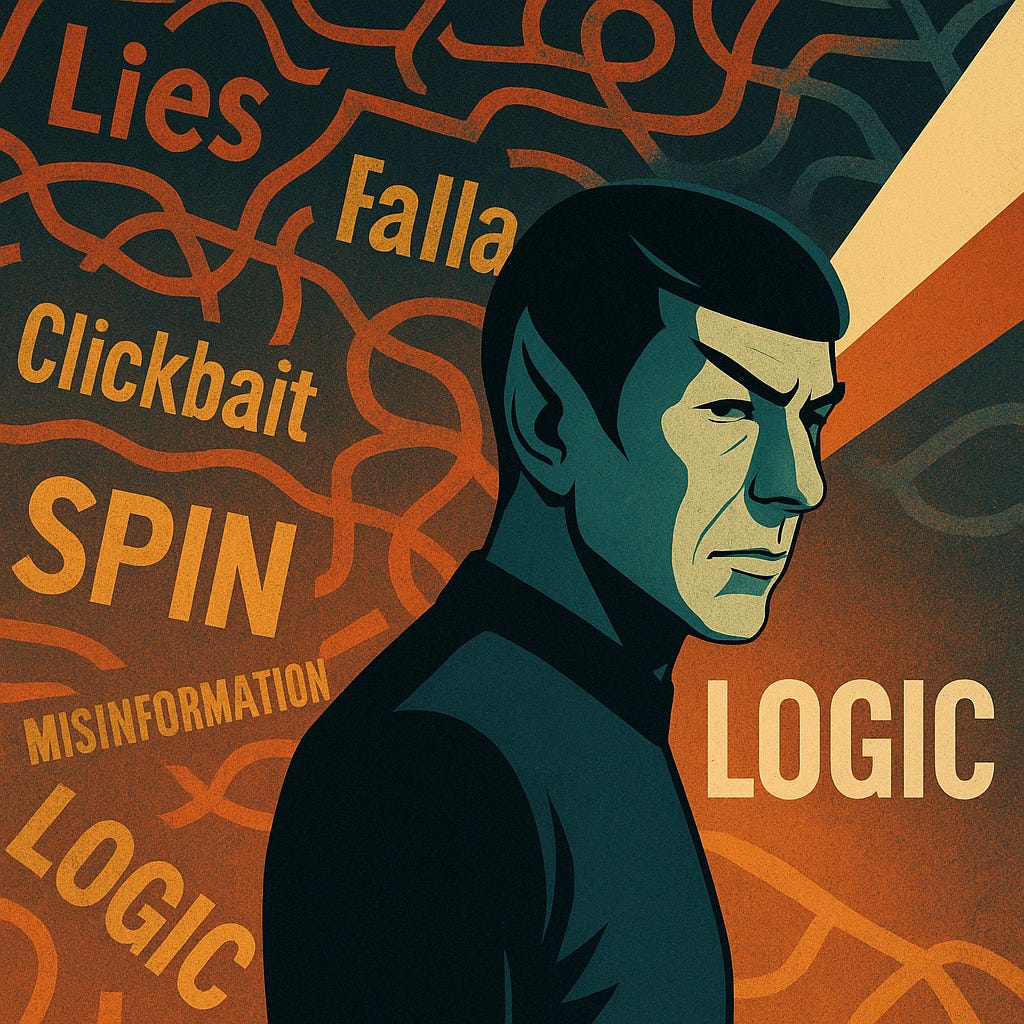The Logic Trap: How to Think Clearly in a World Built to Confuse You
From political spin to corporate jargon, logical fallacies are everywhere—and they’re counting on you not noticing.
Let’s start with a scare.
“Autism is on the rise.”
You’ve seen that headline. Maybe you’ve heard it in a campaign ad or repeated with solemn concern on the nightly news. The implication is chilling: something is wrong. Something—or someone—is to blame.
But here’s the thing: saying “autism is on the rise” may be statistically accurate, but it’s also potentially misleading.
Why?
Because a rise in diagnosis doesn’t necessarily mean a rise in cases. It could just mean we finally have better tools, wider awareness, and a more inclusive understanding of what autism actually looks like. In other words, we’re seeing what was always there.
This is a classic logical misstep—specifically, a false cause fallacy. Confusing correlation with causation. And it happens every day.
Or consider this gem: “The more votes you count, the less chance I’ll win.”
Sounds sinister, right? But pause for a second. What’s actually being claimed? That counting all the votes—something we’re supposed to do in a democracy—is somehow suspicious?
This is circular reasoning at its worst: the speaker presumes their own victory is the baseline truth, so any additional information (like more votes) must be rigged. It’s also a false cause fallacy—assuming that more counting leads to less legitimacy.
The logic isn’t just broken. It’s weaponized.
Why logic matters
We live in an era where truth is up for grabs and outrage pays well. Leaders, influencers, and corporations have figured out that it’s easier to win attention with emotional appeals and logical sleights of hand than it is to offer nuance or admit uncertainty.
But here’s the secret they don’t want you to know: if you understand how logic works—and how it’s abused—you can’t be manipulated as easily.
You don’t have to be Mr. Spock to spot bad logic—but it helps to think like a Vulcan when the BS starts flying.
And that’s what this guide is for.
To help you think clearly, push back confidently, and recognize the tricks when they’re being played.
Next time you’re in an argument—or watching one unfold on cable news—ask yourself:
Which one (or more) of these fallacies is being used right now?
Once you start noticing them, it’s hard to stop. And that’s a very good thing.
The Dirty Dozen: Fallacies That Fool Us All
Straw Man
Misrepresenting someone’s argument to make it easier to attack.
“So you're saying we should just get rid of all police?”
No. That’s not what was said.False Cause
Correlation does not imply causation.
“More people are being diagnosed with autism. Therefore, vaccines must be causing it.”
No. That’s not how evidence works.Appeal to Emotion
Tugging heartstrings instead of offering facts.
“Think of the children!”
We are. That’s why we’re asking for logic, not hysteria.Slippery Slope
Assuming one action will lead to a cascade of disasters.
“If we allow this, next thing you know, it’ll be chaos!”
Or maybe it won’t. Let’s focus on what’s actually happening.Ad Hominem
Attacking the person, not the argument.
“Why should we listen to her? She’s just a failed actress.”
Her résumé isn’t the point. Her argument is.Bandwagon
Popularity isn’t proof.
“Everyone’s saying it!”
That doesn’t make it true. Or right.Black-or-White (False Dilemma)
Presenting only two choices when more exist.
“You’re either with us or against us.”
Or... maybe I think both of you are wrong?Cherry Picking
Only presenting facts that support your argument.
“Crime is up in this one neighborhood!”
And down in ten others. Context matters.Appeal to Authority
Trusting someone just because of their title or fame.
“A celebrity said it on a podcast!”
Cool. But is it true?No True Scotsman
Changing definitions to protect your argument.
“No true patriot would criticize the government.”
So we’re only patriots when we agree?Burden of Proof
Demanding others disprove your claim, instead of proving it yourself.
“Can you prove it didn’t happen?”
That’s not how logic—or science—works.Recency Bias
Believing something is more significant because it just happened.
“This is the worst it’s ever been!”
Or maybe it’s just the most recent bad thing you’ve seen.
How to fight back
You don’t need a philosophy degree to outwit bad logic. Just remember:
Ask: What is this really saying?
Seek context. What’s missing?
Don’t confuse loud with right.
And if it feels like you’re being emotionally steamrolled, pause. That’s usually where the trap is set.
This isn’t about being smug. It’s about being sane.
We don’t need more cynics. We need more citizens—people willing to slow down, ask better questions, and refuse to fall for the same tricks over and over again.
Because once you learn to see the game, it’s a lot harder for anyone—politician, CEO, or influencer—to play you.
So the next time you find yourself in a debate, an online argument, or just absorbing headlines, ask yourself:
Which one—or more—of these fallacies is being used right now?
Once you spot them, you can’t unsee them.
And that’s when the real thinking begins.
Live long and prosper.


